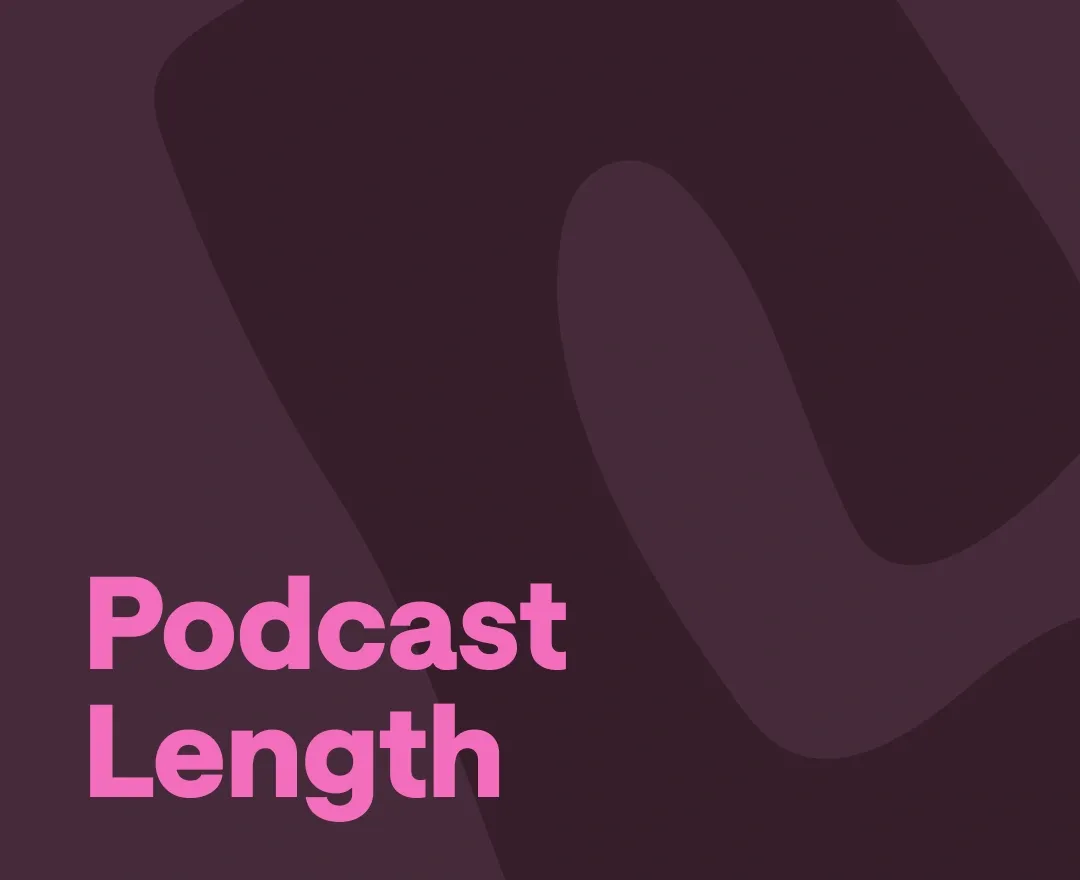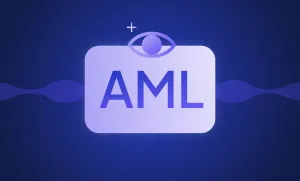The podcast industry is booming! According to a study conducted by Statista in July 2021, approximately 387 million people were listening to podcasts worldwide. This year the numbers are expected to rise to 424 million people worldwide. As the medium continues to grow in popularity, many content creators ponder the question of "How long should a podcast be." What are the main factors that determine episode length? Let's answer these questions together!
How Long Should a Podcast Episode Be?
Dan Misener's insightful research from 2019 sheds light on the podcast episode landscape, revealing an average duration of 41 minutes and 31 seconds. Research over the past few years has shown this figure to be remarkably stable, with most studies producing results that vary only within a narrow range. The 41.5-minute threshold emerges as a sweet spot, striking a balance that accommodates informative discussions without overwhelming the listener.
However, the podcasting realm is rife with exceptions, challenging any notion of a one-size-fits-all approach. Take, for instance, The Daily by The New York Times, which opts for succinct episodes hovering around the 20-minute mark. On the opposite end of the spectrum, shows like The Joe Rogan Experience defy brevity, with episodes extending to a generous two-hour timeframe.
The key takeaway? Tailor the length of your podcast to align with the content you aim to deliver. If your objective involves an in-depth exploration of a specific topic, longer episodes may be the ideal format. Conversely, if you aspire to offer quick tips or updates, shorter episodes can prove just as effective.
Interestingly, Misener's study hasn't unveiled any discernible patterns in the episode lengths of popular shows. The shortest podcast episodes can be as brief as a minute, illustrating the diversity within the podcasting landscape. On the other end of the spectrum, the record for the lengthiest podcast episode globally belongs to Mike Russell, co-founder of the UK Podcasters community and the New Media Europe conference. In a remarkable feat, Russell hosted a non-stop podcast lasting an astonishing 36 hours, earning a place in the annals of podcasting history.
How Long Should a Podcast Intro Be?
Podcast intros typically span a concise 15 to 30 seconds, offering listeners a swift glimpse into the essence of the show and a compelling reason to stay tuned. However, creators wield the freedom to tailor intro lengths to suit the nature of their content. Delving into a comprehensive exploration of a specific topic might warrant a longer intro, ensuring the audience receives all pertinent information. Conversely, if minimal context is required, a shorter introduction can prove effective.
Recognizing that first impressions carry immense weight in the realm of podcasts, crafting an engaging and captivating intro is paramount. The introductory moments serve as the listener's initial encounter with your content, setting the tone for the entire episode. An overly lengthy or tedious opening runs the risk of dissipating the listener's interest before they reach the heart of your show. Thus, investing thoughtful consideration into your podcast intro is imperative—ensuring it captivates and entices, leaving a lasting impression from the very outset. Before hitting the record button, take a moment to carefully shape your intro for maximum impact!
Ideal Podcast Length Varies Between Topics
When we take a look at the relationship between podcast length and content, it's evident that the perfect duration varies across different genres. Below I’ve run through some popular genres to get a rough average runtime for the most successful shows that represent the category.
Daily News
The landscape of Daily News podcasts is characterized by its adaptability, offering a spectrum of show formats that can be grouped into the following four main categories:
Micro Bulletins are short-form audio news programs that provide a brief summary of the day’s top stories. Micro bulletins are typically between 1 and 5 minutes in length and account for only 11% of daily news podcasts. They are designed to provide listeners with a quick update on the latest news headlines, making them ideal for people who are short on time or looking for a quick news fix delivered in a succinct package.
A good example is the BBC World Service’s offering, available every hour on the hour.
Round-ups are a type of podcast that summarizes the most important news stories of the day, week, or month. These podcasts are usually released on a regular basis and provide listeners with a quick and easy way to stay up-to-date on current events. Successful examples of podcasts that fall into this category have average episode run times that range from 7 minutes to just under 15 minutes.
An example on the shorter side of that spectrum is CBS News Roundup, which provides daily news bulletins that wrap up the major headlines you need to know every day. The weekday morning edition is hosted by Steve Kathan and is called the “World News Roundup”. The evening edition is hosted by Jennifer Keiper and is called the “World News Roundup: Late Edition”. The weekend edition is hosted by Allison Keyes and is called “Weekend Roundup”. Each episode features a “Kaleidoscope” segment that takes on social justice issues and critical topics like race, gender, disability, income inequality, and beyond. The average episode run time is around 5-7 minutes.
On the longer side of the spectrum is Up First, a daily news podcast that provides listeners with a quick update on the latest news headlines in under 15 minutes. The podcast is hosted by NPR’s Rachel Martin, David Greene, and Steve Inskeep, who provide a concise summary of the day’s top stories. The podcast covers a wide range of topics, including politics, business, science, and technology. The average episode run time is 13 minutes.
Deep Dives are a type of podcast that provides an in-depth analysis of a particular news story or topic. These podcasts are quite a bit longer than traditional news bulletins and round-ups–aiming to provide listeners with a comprehensive understanding of the subject matter in anywhere from 20–30 minutes.
A well-known example of this news show category is The Daily, which is produced by The New York Times and hosted by Michael Barbaro.The Daily delivers concise (around 20 minutes) overviews of the day's top news stories. Each episode dives deep into a single topic, featuring interviews with journalists, experts, and sometimes even the newsmakers themselves.
Similarly, the podcast Full Story is produced by The Guardian and provides a deep dive into a single news story each weekday. Hosted by Laura Murphy-Oates, each episode is about 25 minutes long and features interviews with reporters and experts. The podcast covers a wide range of topics, from politics and current affairs to culture and society.
Extended Chat news podcasts are like the cozy fireside discussions of the news world, offering in-depth conversations, engaging analysis, and often lively debate on current events. Think of them as longer, more casual counterparts to traditional news broadcasts, where hosts and guests delve deeper into the headlines, offering diverse perspectives and fostering a sense of community among listeners. The typical episode length for extended chat news podcasts can vary widely, but most are at least an hour.
A prime example of this kind of podcast is Pod Save America, a show devoted to political news and hosted by former Obama officials that usually clocks in at 1-2 hours an episode.
The Joe Rogan Experience is arguably one of the most popular podcasts in production and features host Joe Rogan engaging in lengthy, open-ended conversations with guests on a wide range of topics, often venturing beyond news headlines and delving into philosophical, scientific, and personal conversations. Its freeform format and Rogan's conversational style foster deep exploration and a sense of intimacy with guests, and his shows often near three hours in length.
Business
Within the domain of business podcasts, episodes structured around interviews commonly aim for a duration of 30-45 minutes. This timeframe strikes a delicate balance, offering ample room for meaningful discussions without succumbing to unnecessary prolongation. However, if you find yourself at the helm of your business podcast, you possess the creative liberty to shape the length of your episodes. Pragmatically, maintaining episodes within the 30-minute threshold proves optimal, especially when navigating tight budget constraints. This strategic approach guarantees a consistent release schedule without compromising the quality of the content.
HBR IdeaCast is a perfect example of a business podcast that consistently manages to hit the timing sweetspot. Harvard Business Review's production specializes in bite-sized wisdom, delivering actionable insights from leading experts in 20-30 minute episodes. Each episode tackles a specific business topic with practical advice and thought-provoking perspectives.
The GaryVee Audio Experience is much looser with its structure, but Gary Vaynerchuk's daily dose of business and marketing inspiration usually delivers its actionable tips and motivational messages in 30-45 minute episodes. Gary covers a wide range of topics, from social media strategies to personal branding, with his signature blend of energy and enthusiasm.
Fitness, Health & Motivation
Podcasts dedicated to fitness, health, and motivation thrive in a realm where brevity is key. The sweet spot for episode duration falls within the 20-30 minute range, catering to listeners seeking quick and impactful doses of inspiration, health advice, or fitness insights during their daily commute or workout sessions. This carefully calibrated duration strikes a harmonious balance, delivering valuable information without overwhelming the audience's time commitment.
20 Minute Fitness is a quick and super informative podcast that stakes its claim on the 20 minute runtime. During each episode, the cast unravels the science and tech of current fitness trends and research. You’ll hear about nutrition, training, tech, and methodology in bite-sized pieces.
The Mindset Mile also explicitly uses it’s length as a selling point, combining aspects of a motivational podcast with an activity challenge. Hosted by Aisha Zaza, the first 30 episodes challenge you to walk or run one mile each day while listening to the daily episode, which usually clocks in around 30 minutes. During the cast, you’ll hear discussions about mindset shifts to encourage motivation in fitness, health, well-being, and more.
Crucially, it's imperative to recognize that the length of your podcast has a direct and tangible impact on your production schedule. Shorter episodes inherently demand less time for production compared to their lengthier counterparts. This consideration becomes particularly pivotal when navigating a tight budget or constrained timeframes. Aligning the length of your episodes with the available resources represents a strategic move, ensuring a sustainable and consistent podcasting journey without compromising on the quality of your content.
Finding The Flow: Letting Structure Define Length
Podcasts come in all sorts of lengths – there's no fixed rule. Some are super short, just a few minutes, while others can go on for hours. The right length depends on what the podcast is about, who it's for, and what the creators like. Let's break it down into categories:
1) Short-Form Podcasts (Under 15 minutes): These focus on one specific thing and are great for quick updates, daily news, or short discussions.
2) Standard-Length Podcasts (30 minutes to 1 hour): Most podcasts fall in this range. It gives enough time for deeper talks, interviews, and covers a variety of topics from storytelling to education and entertainment.
3) Long-Form Podcasts (1 hour to several hours): These are for really digging into complex subjects, doing detailed interviews, or telling a story that unfolds over time.
4) Episodic Series: Some podcasts have a bunch of episodes that can be different lengths. Each episode tells a part of the story and can vary in how long it is based on what the story needs.
If you want your podcast to appeal to a broad audience, aiming for about 44 minutes is a good starting point. But, if you have a specific group of people in mind, you might want to think about making your episodes shorter or longer. Take a close look at your audience to figure out what they like. Understanding their preferences lets you tailor your content to what they really care about. It's a smart move to make your podcast fit the unique needs and interests of your listeners.
Closing Points
So, how long should your podcast be? As with most things in podcasting, the answer is that it depends! Consider the type of content you want to produce and the amount of time you are ready to dedicate to producing each episode.
Also, don't hesitate to check our guidelines to learn more about the winning ways of getting more engagement on your shows. Once you've considered these factors, you'll be able to determine the perfect length and strategy for growing your show.








